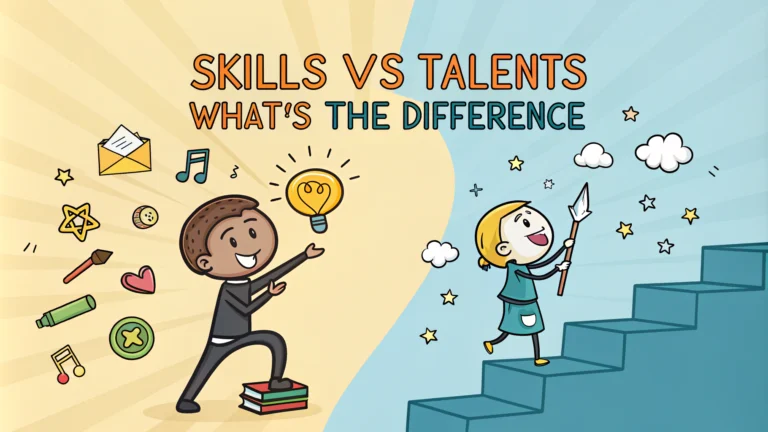The distinction between skills and talents shapes career choices, personal development, and learning paths. Natural abilities and learned competencies each play unique roles in personal and professional success.
**Skills** represent learned abilities through practice and dedication, while **talents** are natural aptitudes that come more easily. Understanding this difference helps create better self-development strategies and career planning.
The Science Behind Natural Talents
Research shows that **genetic factors** influence certain abilities and predispositions. **Brain structure** and **neural pathways** contribute to natural talents, affecting how quickly someone can grasp specific concepts or perform certain tasks.
- Innate pattern recognition
- Musical ability
- Athletic coordination
- Spatial awareness
How Skills Development Works
**Skills acquisition** follows a predictable pattern of learning and improvement through deliberate practice. The brain creates new neural connections through repetition and focused effort.
| Learning Stage | Characteristics |
|---|---|
| Beginner | Conscious effort, frequent mistakes |
| Intermediate | Improved accuracy, some automation |
| Advanced | Fluid performance, unconscious competence |
Maximizing Your Natural Abilities
Identifying personal talents allows for strategic career and hobby choices. **Self-assessment tools** and **performance patterns** help recognize natural strengths.
“While talent sets the foundation, dedication and practice build the house.”
- Track activities that feel naturally enjoyable
- Notice tasks where learning comes easily
- Observe consistent performance patterns
Optimizing Performance Through Practice
**Strategic practice methods** enhance both skills and talents. Research shows that **focused repetition** with immediate feedback creates lasting improvements.
- Set specific, measurable goals
- Practice in short, intense sessions
- Seek expert feedback regularly
- Track progress systematically
Combining Skills and Talents
The most effective approach leverages both natural abilities and developed skills. **Complementary abilities** create unique advantages in professional settings.
| Natural Talent | Supporting Skill |
|---|---|
| Creativity | Technical software proficiency |
| Leadership instinct | Communication techniques |
| Mathematical aptitude | Data visualization |
Overcoming Limitations
Understanding personal limitations helps develop effective workarounds. **Adaptive strategies** and **alternative approaches** can compensate for areas of weakness.
“Success often comes not from changing your nature, but from finding your best fit.”
- Identify specific challenges
- Develop compensation strategies
- Build support networks
- Focus on strength-based solutions
Building Long-term Success
**Sustainable growth** comes from aligning natural talents with acquired skills. Regular assessment and adjustment of development plans ensures continued progress.
Focus on creating a balanced approach that recognizes both innate abilities and the value of dedicated practice. Remember that personal growth is an ongoing process that requires patience and persistence.
- Review and adjust goals quarterly
- Maintain learning journals
- Seek mentorship opportunities
- Create accountability systems
FAQs About Skills vs Talents
Q: What is the main difference between skills and talents?
A: Skills are learned abilities developed through practice and education, while talents are natural aptitudes or innate abilities present from birth. Skills can be acquired by anyone with proper training, whereas talents are inherent predispositions.
Q: Can talents be improved through practice?
A: Yes, natural talents can be enhanced through dedicated practice, training, and proper guidance. However, the initial advantage of having a talent typically results in faster progress compared to those starting without it.
Q: Are skills more valuable than natural talents in the workplace?
A: Both have their value, but developed skills often carry more weight in professional settings because they demonstrate:
- Dedication to learning
- Work ethic
- Ability to adapt
- Practical experience
Q: How long does it take to develop a skill vs utilizing a talent?
A: Research suggests developing professional competency in a skill typically takes:
| Basic proficiency | 20-50 hours |
| Advanced level | 1,000-4,000 hours |
| Mastery | 10,000+ hours |
Talents require less initial time investment but still need development.
Q: Can someone succeed without natural talent in their chosen field?
A: Yes, many successful professionals have achieved excellence through acquired skills and determination rather than natural talent. Consistent practice and learning often outweigh natural aptitude.
Q: What are examples of skills vs talents in creative fields?
A:
Skills:
- Photo editing
- Color theory application
- Technical drawing
Talents:
- Perfect pitch
- Visual-spatial awareness
- Color sensitivity
Q: How do employers evaluate skills vs talents during hiring?
A: Employers typically assess:
- Skills through portfolios, certifications, and practical tests
- Talents through behavioral interviews and aptitude assessments
Q: What’s the relationship between natural talent and skill development?
A: Natural talent often provides a head start in skill development, but the ultimate level of achievement depends more on sustained effort and practice than initial talent.
Q: How can you identify your natural talents vs learned skills?
A: Natural talents typically show up as:
- Activities that feel effortless
- Quick learning in specific areas
- Above-average performance without training
- Natural enjoyment of certain tasks
Q: Do talents become obsolete in the modern workplace?
A: No, but they need to be complemented by contemporary skills. A natural talent for mathematics, for example, needs to be paired with modern technical skills to be most effective in today’s workplace.



















